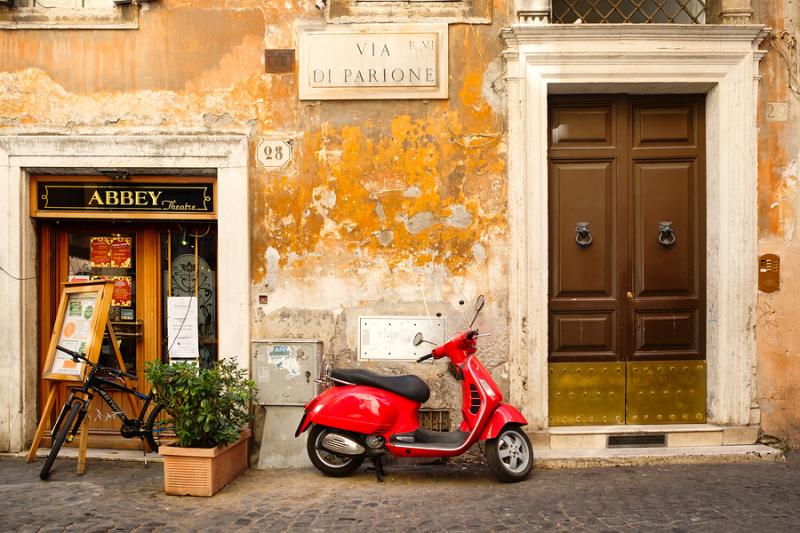More people than ever before are exploring the world in search of the undiscovered, the new, the ultimate experience. All too often, though, you can travel thousands of miles only to find a kind of bland familiarity.
But Italy is different. Italy has individuality. I set myself the task of trying to define exactly what makes Italy unique.
Imagine being parachuted blindfold into an Italian piazza. How would you instinctively know you were in Italy? Being blind, you’d have to rely on the sounds and the smells around you.

It would be impossible in a piazza anywhere in Italy not to hear the clattering of coffee cups, the hiss of an espresso machine and the constant slam dunk banging to empty the dregs. Perhaps you would also hear a bit of Mozart wafting through the air from a busker, and probably not too far away, the siren of a police car.
That’s just the sounds. You’d also have the familiar smells of Italy. First, the all-pervading smell of high roast coffee, but closely followed by the vanilla scent coming from a pasticceria. These are the predominant street smells, but other scents invade the senses when you stroll about. At the beginning of June lime trees burst into blossom and their powerful scent is almost like walking through a miasma of honey vapour.

Like this article? You might want to read "How to Order Coffee Like an Italian."
Go into any cantina and you have the sensation of breathing in heavy droplets of wine, or equally in a frantoio (olive mill) you will have such a strong sense of the perfume of crushed olives that it is almost tangible.
Around Italian coasts or swimming pools in summer you have the perfumes of many brands of sun tan cream, especially the dominant coconut aroma. You can of course find these elsewhere, but they are more concentrated in Italy given the Italian love of sun beds in regimented rows with everyone massed together, which naturally gives rise to the buzz of spirited conversations, especially about food.
This nicely leads to the next sense, taste. What are the typical flavours of Italy? Herbs like oregano, basil and rosemary come top of the list. What would Italian food be without its flavoursome tomatoes and lemons, its garlic and parmesan? We mustn’t forget the national obsession with Nutella, and coffee makes an appearance again – sound, smell and taste - and last but not least, the Italian love of gelato/ ice cream in a kaleidoscope of colours and flavours. No stroll around any Italian town or city is complete without a cono or a coppa in one hand.

The sights of Italy are not just the clichés of Pisa’s leaning tower, or the Grand Canal in Venice. Away from the crowds, what makes the landscape and people typically Italian? Is it the lines of poplars or umbrella pines against fields of sunflowers with campanile in the distance? Partly, but they are the background to sights you probably couldn’t find anywhere else. It’s the sight of old women out with scissors in the early morning snipping at wild herbs in the verges and between the rows on vines, to mix with ricotta for a delicious ravioli filling. It’s the sight of old men meeting at a corner bar for a morning glass of wine to compare the contents of their carrier bags – snails gathered at dawn. And in winter, it’s the sight of ladies of a certain age wearing fur coats and riding bicycles whilst holding up an umbrella.
The Italian love of dressing up is in their DNA with words like bella figura and sprezzatura (a kind of nonchalant elegance) in everyday use. It shows itself in over-elaborate uniforms: officials with lots of braid and high-peaked hats, or police with tons of hardware dangling from belts, looking like giant charm bracelets. Policewomen in Italy don’t wear sensible shoes for pounding the beat, but high heels, and balance their caps incongruously on masses of corkscrew curls. Even the weather presenters on TV appear in military uniform looking stern and official as they point their batons at the isobars.
Cycling clubs abound, and with them the full lycra gear, each club with a matching uniform as they whizz past in a blur of neon, lime green and shocking pink.
These are all positive endearing aspects of Italian life, but there are negative ones too. Mention bureaucracy and every Italian will go into overdrive, animatedly enumerating countless examples to do with taxation, house purchase, local and national government etc. Bank charges are exorbitant, and paying bills, for instance over the post office counter, can incur an extra tax just for the pleasure of paying. And woe betide the late payment of a major tax bill. The fine will be an extra third of the amount owed. Italian politicians are the highest paid in Europe despite huge unemployment figures and inflation.
But that’s Italy for you, warts and all.
You love the country for all its faults because it more than compensates, with its welcoming generosity of spirit, that indefinable warmth which makes you feel happy and instantly at home.













